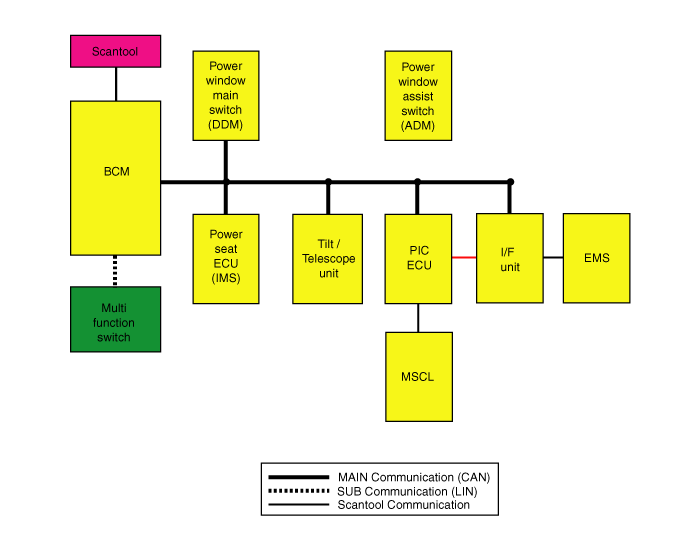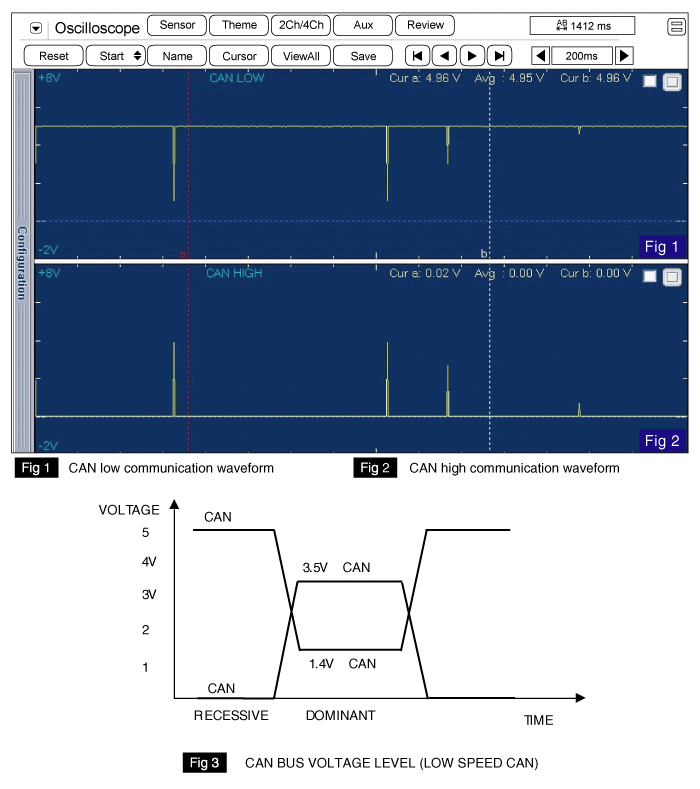

To make system be more
efficient, Personal IC Card system(hereinafter referred to PIC system)
applies LIN(Controller Area Network) communication system. CAN is a kind
of communication system which can make related component share system
information with just two line instead of complex individual signal
line.
It consists of related
component and CAN BUS which consists of CAN high line and CAN low
line.
The 6 components related
with Body Control Module(hereinafter referred to BCM) connect with each
other via CAN(Controller Area Network) communication system. These are
BCM. Assist Door Module (ADM), Drive Door Module (DDM), Power Seat Unit
(PS), tilt/telescope control unit and Personal Identification Card
(PIC).
Wiper Motor Module (WMM)
and Mulit-Function Switch (M/F) connect with BCM via LIN (Local
Interconnect Network). Therefore it is possible to diagnose an overall
system with scantool.
*¹ CAN (Cotroller Area
Network) : CAN is a serial bus system especially suited for networking
"intelligent" devices as well as sensors and actuators within a system or
sub-system.
*² LIN (Local
Interconnect Network) : LIN is a new low cost serial communication system
intended to be used for distributed electronic systems in vehicles, which
complements the existing portfolio of automotive multiplex
networks.

To make communication be
more accurate, every signal via CAN BUS contains error flame. Each
component counts error and if accumulative error count in one node is
above specified value, the ECM sets DTC 'B1603' and pertinent component is
electronically separated.
This code means that
there is a problem in CAN BUS between BCM and following control modules;
Assist Door Module (ADM), Drive Door Module (DDM), Power Seat Unit (PS),
tilt/telescope contor unit and Personal Identification Card
(PIC).
It is set if the can
line short circuited each other is short circuited to
battery/ground.
It is unable to transmit
data to other module when this code is set but receiving data is
possible.
Item
|
Detecting
Condition
|
Possible Cause
|
DTC
Strategy
|
|
|
Enable
Conditions
|
|
Threshold
Value
|
|
Detecting
time
|
|
Item
|
Detecting
Condition
|
Possible cause
|
DTC
Strategy
|
| •
|
Check CAN communition
state. | |
|
Enable
Conditions
|
| •
|
Unable to transmit data via CAN
line. | |
Threshold
Value
|
| •
|
CAN line short to each other is short
circuited to ground. |
| •
|
CAN line short to each other is short
circuited to battery. | |
Diagnostic
Time
|
|

Fig 1) CAN high
communication waveform
Fig 2) CAN low
communication waveform



| 1. |
Connect scantool to Data Link
Connector(DLC). |
| 2. |
Ignition "ON" & engine
"OFF" |
| 3. |
Selet "Diagnostic Trouble Codes(DTCs)"mode and
monitor "DTC Status" parameter.

Fig 3) DTC
B1603. |
| 4. |
Is the DTC 'B1603' present ?
|

|
▶ Go to "
Inspection/Repair " procedure.
|
|

|
▶ Fault is
intermittent caused by poor contact in the sensor's and/or
ECM's connector or was repaired and ECM memory was not
cleared. Thoroughly check connectors for looseness, poor
connection, bending, corrosion, contamination, deterioration,
or damage.
Repair or replace as
necessary and then go to "Verification of Vehicle Repair"
procedure.
|
|
| 1. |
Ignition "OFF", connect
scantool. |
| 2. |
Ignition "ON" & Engine "OFF", select
"Diagnostic Trouble Codes(DTC)"
mode. |
| 3. |
Monitor diagnostic trouble code and present of
trouble code. |
| 4. |
Using a scan tool, clear the DTC.

|
| 5. |
Are any DTC present?
|

|
▶ Go to
"W/Harness Inspection" procedure.
|
|

|
▶
Displaying nothing(no DTC) shows that Fault is intermittent
caused by poor contact in the part's and/or BCM connector or
was repaired and BCM memory was not cleared.
Thoroughly check connectors for looseness, poor
connection, bending, corrosion, contamination, deterioration,
or damage.
▶ Repair or replace as
necessary and then go to "Verification of Vehicle Repair"
procedure.
|
|
| Terminal And Connector
Inspection |
| 1. |
Many malfunctions in the electrical system are
caused by poor harness(es) and terminals. Faults can also be caused
by interference from other electrical systems and mechanical or
chemical damage. |
| 2. |
Check the following conditions:
| (1) |
Check for damaged harness and terminals:
contact resistance, oxidation, bent or broken
terminals. |
| (2) |
Check for poor connection between ECM
and component: backed out terminal, improper mating, broken
locks and poor terminal to wire
connection. |
|
Using a suitable male pin to ensure that
contact in sockets is good. The pin should remain in position
when pulled
gently. | |
| 3. |
Has a problem been found?
|

|
▶ Repair as
necessary and then go to "Verification of Vehicle Repair"
procedure.
|
|

|
▶ Go to
"Component Inspection"
procedure.
|
|
Check Related Component.
| 1. |
Connect scantool to Data Link
Connector(DLC). |
| 2. |
Ignition "ON" & engine
"OFF" |
| 3. |
Selet "Diagnostic Trouble Codes(DTCs)"mode and
monitor "DTC Status" parameter. |
| 4. |
Check if the DTC is erased while disconnecting
related component one after another.
* Related component : BCM,PIC
ECU.. |
| 5. |
Is the DTC erased ?
|

|
▶
Substitute with a known-good pertinent component and check for
proper operation.If the problem is corrected, replace
pertinent component and then go to "Verification of Vehicle
Repair" procedure.
|
|

|
▶ Check
connectors for looseness, poor connection, bending, corrosion,
contamination, deterioration, or damage.
Repair or replace as necessary and then go to
"Verification of Vehicle Repair"
procedure.
|
|
| Verification Of Vehicle
Repair |
After a repair, it is
essential to verifying that the fault has been corrected.
| 1. |
Connect scan tool and select "Diagnostic
Trouble Codes(DTCs)" mode. |
| 2. |
Using scantool, Clear
DTC. |
| 3. |
Operate the vehicle within DTC Enable
conditions in General information. |
| 4. |
Are any DTCs present ?
|

|
▶ Go to the
applicable troubleshooting procedure.
|
|

|
▶ System is
performing to specification at this
time.
|
|